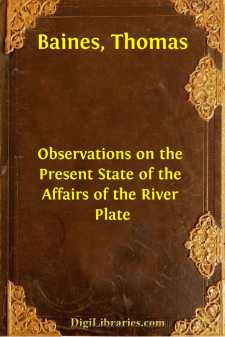Categories
- Antiques & Collectibles 13
- Architecture 36
- Art 48
- Bibles 22
- Biography & Autobiography 813
- Body, Mind & Spirit 142
- Business & Economics 28
- Children's Books 17
- Children's Fiction 14
- Computers 4
- Cooking 94
- Crafts & Hobbies 4
- Drama 346
- Education 46
- Family & Relationships 57
- Fiction 11829
- Games 19
- Gardening 17
- Health & Fitness 34
- History 1377
- House & Home 1
- Humor 147
- Juvenile Fiction 1873
- Juvenile Nonfiction 202
- Language Arts & Disciplines 88
- Law 16
- Literary Collections 686
- Literary Criticism 179
- Mathematics 13
- Medical 41
- Music 40
- Nature 179
- Non-Classifiable 1768
- Performing Arts 7
- Periodicals 1453
- Philosophy 64
- Photography 2
- Poetry 896
- Political Science 203
- Psychology 42
- Reference 154
- Religion 513
- Science 126
- Self-Help 84
- Social Science 81
- Sports & Recreation 34
- Study Aids 3
- Technology & Engineering 59
- Transportation 23
- Travel 463
- True Crime 29
Observations on the Present State of the Affairs of the River Plate
by: Thomas Baines
Description:
Excerpt
The destructive war which has now been waged for so many years, by the Chief of the Province of Buenos Ayres against the Republic of Uruguay, involves questions of so much importance to the commercial interests, and to the national honour of England, that nothing can account for the very slight attention which it has received from Parliament and the press, except the fact that many of the principal considerations connected with it have never yet been fully brought before the British public. In order to supply this deficiency, and to show how much it concerns the character of this country that this war should at once be brought to a close in the only manner in which it can be ended; that is, by the prompt and decided interference of the Governments of France and England, I have thought that it might be useful to lay before the public the following observations and documents, explanatory of the principles involved in the war; of the conduct pursued by Mr. Mandeville, the British Minister to the Argentine Confederation, at the most critical period of its progress; and of the strong and rapidly-increasing interest which this country, and more especially the port of Liverpool, has in the preservation of the threatened independence of the Republic of Uruguay.
Most of the readers of these remarks are no doubt aware that the Province of the Banda Oriental, or eastern bank of the River Plate, was first constituted an independent state, under the title of the Republic of Uruguay, at the close of the war between the Argentine Confederation and the Empire of Brazil, in the year 1828. This arrangement was in a great measure brought about by the good offices of Lord Ponsonby, the Ambassador of the British Government to the Court of Rio, and the result of his negociations was so agreeable to the English Government, that the peace thus concluded was made a subject of congratulation in the speech from the throne in the year 1829. The principal object in forming this new Republic was, to put an end to the destructive war between Buenos Ayres and Brazil, originating in the claims put forward by both these countries to the possession of the Province of the Banda Oriental. The Brazilians, who had had possession of it for several years, were naturally unwilling to have so warlike and powerful a state as the Argentine Republic on their most vulnerable frontier, and the Argentines were not less unwilling to have the Brazilian frontier pushed more than a hundred leagues up the River Plate, and within the limits of the ancient Viceroyalty of Paraguay, which had for ages been occupied by the Spanish race. As the only effectual solution of these difficulties, the English Government proposed that the Banda Oriental should be rendered independent of both countries, and this, after some negociation, was agreed to by all the parties concerned.
The primary object of the mediation of the English Government was the re-establishment and preservation of peace and amity between two nations, with both of which England had valuable commercial relations; and this object has been completely gained by the arrangement then effected. During the sixteen years which have elapsed since the treaty was concluded, no serious difference has occurred between Brazil and the Argentine Confederation, nor is any likely to occur so long as the barrier of an independent state is interposed between them. It is only during the last two years that serious discussions have arisen between them, and these have originated in the fears of Brazil, lest the successes of the Buenos Ayrean army, now before Monte Video, should be such as to break down the barrier established by the Ponsonby treaty, and again to bring the Buenos Ayreans on the frontiers of Rio Grande. From apprehension of this event, the Brazilian Government has allowed General Paz, with his military staff, to pass through its territory to place himself at the head of the Correntino insurgents, who have risen against Rosas, and made common cause with Monte Video; it has also recalled Admiral Grenfell, its commander in the River Plate, as well as its diplomatic agent at Monte Video, for engaging in an ill-timed quarrel with the Monte Videan Government; and if the Buenos Ayrean army should succeed in gaining possession of the city of Monte Video, it will in all probability, whether backed or not by England and France, decide to take part in the war, rather than allow General Rosas to succeed in the designs which he now avows on the Republics of Uruguay and Paraguay, the two bulwarks of the western provinces of the Brazilian empire....


